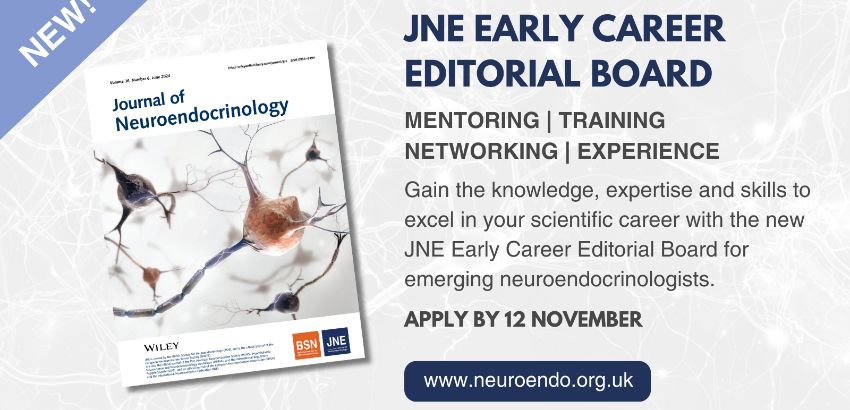
Applications open to join the first JNE Early Career Editorial Board
The Journal of Neuroendocrinology (JNE) is delighted to announce applications are open for a new Early Career Editorial Board, formed as part of JNE’s commitment to the neuroendocrine community and the support of early career researchers (ECRs) in the field across the world.
Applications are now open for neuroendocrine ECRs from diverse backgrounds to join this new Early Career Editorial Board. Ten ECRs will be selected, with appointments made for one year starting January 2025. The deadline is 12 November 2024.
The JNE Early Career Editorial Board will empower emerging neuroendocrinologists with knowledge, expertise and skills related to science publishing and peer review to excel in their scientific career.
ECRs joining this new Editorial Board will have the opportunity to participate in on-going development of the programme with senior editors to ensure the experience meets the needs of the ECRs while also gaining the knowledge and experience on how the journal publishing process works.
Benefits for early career researchers
- Mentoring from senior JNE editors aligned to your area(s) of research on the editorial process.
- Experiential learning through shadowing a senior editor from your area of research expertise.
- Access comprehensive career development online workshops on science publishing and peer-review.
- Networking with peers on the ECR editorial board and mentors from the JNE senior editorial board.
- Opportunity to provide feedback on the content published in the journal, and suggest special issues, commentaries, and topical reviews.
Proposed structure
- Up to 10 ECRs will be appointed in the first cohort.
- Initial term of appointment will be for 1-year with the opportunity for renewal for a second year, subject to mutual agreement.
- Each ECR will be matched with a senior editor mentor, who has related research interests and/or experience.
- Initially, the JNE ECR editorial board will be trialled for the FMN strand, with future potential to expand to the TCN strand if desired by the respective EiCs.
ECR roles and responsibilities
- Commit to attending training and professional development workshops associated with editorial processes, including peer review, ethics, rigor and reproducibility, data sharing, and hot topics in science publishing such as use of generative AI.
- Working together with your senior editor mentor, contribute timely and constructive peer-review of articles submitted for publication to the JNE (up to a maximum of 6 papers per year).
- Attend virtual editorial board meetings and an annual in-person meeting if feasible.
- Provide feedback to the JNE leadership and represent the needs of the ECRs in the development of the journal.
- Serve as advocates for JNE and its role as a society-based journal in the community.
Eligibility requirements
- ECRs working in neuroendocrinology within 10-years of award of PhD, DVM or MD (or equivalent clinical qualifications).
- Exceptions can be made for career breaks (including COVID-associated disruptions).
- When an individual has more than one doctoral degree, the date of completion of the first will count towards the qualification period.
- A current member of one of the following learned societies that has JNE as its official journal:
- British Society for Neuroendocrinology (BSN)
- Pan American Neuroendocrine Society (PANS)
- Hypothalamic Neuroscience and Neuroendocrinology Australasia (HNNA)
- International Regulatory Peptide Society (IRPS)
- European Neuroendocrine Tumour Society (ENETS)
- European Neuroendocrine Association (ENEA)
- Must not have previously served on an editorial board at another journal.
- ECRs from historically excluded and/or under-represented populations are particularly encouraged to apply.
- ECRs from across the globe are welcomed.
Application materials
APPLY VIA THE APPLICATION FORM
- Brief CV
- Confirmation of membership in one of the named learned societies.
- Please upload a covering letter (max. two A4 pages) which includes:
- What do your hope to get out of your participation on the ECR board?
- How important will this position be in light of your other current career goals?
- Details about your engagement with the neuroendocrinology community via the learned society to which you belong.
- Please upload a covering letter (max. two A4 pages) which includes:
- Letter from current supervisor or head/chair of department/unit providing conformation of support/protected time.
Selection criteria
- Personal/career developments benefits to ECR.
- Evidence of motivation and commitment to the field of neuroendocrinology.
- Where possible a balance of demographics (sex/gender, research areas, geographic location and ethnicity) will be sought.
- Scoring of applications will be performed by the EIC, deputy-EIC and a selected panel of senior editors.

